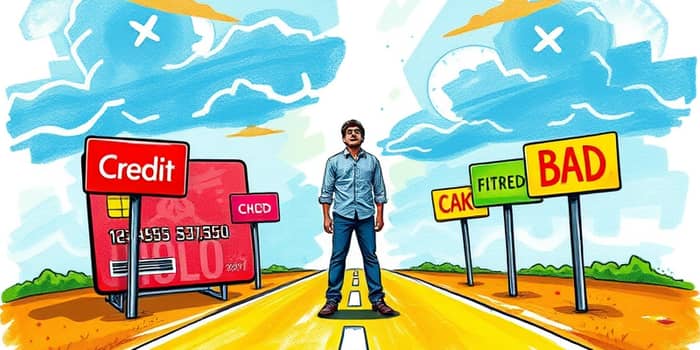Credit cards can be powerful tools when managed wisely, but they also carry significant risks if you fall into common traps. Understanding these pitfalls and adopting smart habits can protect your score, your wallet, and your peace of mind.
Payment-Related Mistakes
Missing a payment or paying only the minimum can have serious long-term consequences. Interest charges can skyrocket and fees can pile up, dragging down your credit score and financial freedom.
- Not paying on time: Missing or late payments can stay on your credit report up to seven years.
- Making only minimum payments: Unnecessary interest accumulation grows your debt month after month.
- Carrying a balance: Rollover debt increases interest charges significantly over time.
Late or missed payments can trigger penalty rates, collection notices, and damage to your reputation with lenders. To break this cycle, stay vigilant about deadlines and totals due.
Credit Utilization Issues
Your credit utilization ratio—the percentage of your available credit you’re using—plays a crucial role in your FICO score. Experts recommend keeping this below 30% to avoid signaling financial strain to lenders.
- Ignoring credit utilization ratio: Keep utilization below thirty percent threshold to maintain healthy scores.
- Overspending: Purchasing beyond means drowns finances quickly and can lead to missed payments.
Even if you pay on time, maxing out cards can suggest risk to creditors. Track your balances and plan purchases within your budget.
Application and Account Management Mistakes
Applying for too many cards or closing longstanding accounts can harm your credit history length and introduce multiple hard inquiries, both of which can lower your score.
- Applying for multiple cards: Frequent inquiries damage your credit score more than you might realize.
- Closing old credit card accounts: Shortened credit history harms your rating by lowering the average account age.
- Not reviewing credit card statements: Missed errors or fraud can go unnoticed and escalate into bigger issues.
Maintaining a diverse but manageable account portfolio and monitoring statements carefully will help you catch mistakes or unauthorized charges early.
Best Practices to Avoid Credit Card Mistakes
Building healthy credit habits starts with small, consistent actions. By automating payments and reviewing your finances regularly, you ensure on-time payments and accurate records.
You can pay your balance in full each month to dodge interest altogether. Set up autopay or calendar reminders to eliminate the risk of missed due dates.
It’s wise to review statements monthly to detect discrepancies such as fraud, duplicate billing, or unauthorized purchases. Early detection makes resolution faster and easier.
Keep your utilization low by spreading expense across multiple cards or paying down balances mid-cycle. When you plan purchases and stick to a budget, you avoid the trap of chasing high balances.
Low Interest Credit Card Options for 2025
If you need flexibility for balance transfers or large purchases, consider cards offering extended 0% APR periods. Compare features and fees to find the best fit.
Balance transfer promotions can save thousands in interest when used strategically. Always check whether balance transfer fees apply and align the offer period with your repayment plan.
Demographics and Emerging Trends
Younger consumers often have shorter credit histories and lower limits, making them more vulnerable to high utilization and overspending. As they mature financially, prudent habits become even more critical.
Credit card fraud continues to rise, with global losses expected to reach $43 billion by 2026. Account takeover schemes now dominate, underscoring the importance of monitoring alerts and securing personal data.
Higher average credit limits—nearly $30,000 in the U.S.—offer spending freedom but also tempt overspending if unchecked. Balancing convenience with responsibility will define financial health in 2025 and beyond.
Conclusion
Avoiding common credit card mistakes requires awareness, discipline, and proactive management. By understanding how payments, utilization, and account behaviors affect your credit, you can navigate the landscape with confidence.
Adopt these practices today: automate payments, track spending, review statements, and choose products that align with your goals. With consistent effort, you’ll build a resilient credit profile and unlock the full benefits of responsible card use.
References
- https://www.bankrate.com/credit-cards/advice/credit-card-mistakes-roundtable/
- https://www.cnet.com/personal-finance/credit-cards/credit-card-mistakes-you-shouldnt-repeat-in-2025/
- https://www.joinkudos.com/blog/credit-card-mistakes-you-shouldnt-repeat-in-2025-a-comprehensive-guide
- https://www.instagram.com/ramit/p/DGVU7x-AIg8/?locale=zh-hans
- https://thepointsguy.com/credit-cards/first-credit-card-mistakes/
- https://www.experian.com/credit-cards/best-low-interest/
- https://quailcreek.bank/top-credit-card-mistakes-to-avoid-and-how-to-stay-on-track/
- https://use.expensify.com/blog/credit-card-statistics










